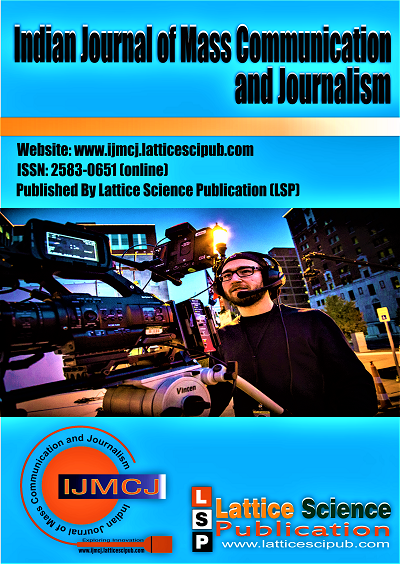Wrong use of Feminism on Social Media Platforms
Main Article Content
Abstract
This work explores the pervasive misappropriation of feminism on social media platforms. It delineates how feminism is often misrepresented, diluted, and commodified for commercial gain, leading to a shallow understanding of its core principles. Furthermore, it discusses the propagation of toxic femininity under the guise of feminism, the polarization of discourse, and the neglect of intersectionality. By examining these issues, the abstract underscores the detrimental impact of the wrong use of feminism on social media, emphasizing the need for critical engagement and inclusive dialogue to reclaim the movement's integrity and effectiveness. A survey has been conducted based on Google form of 50 questions among the common people for the identification of the opinions of people on the negative aspects that social media has on the promotion of feminist theories among the common people. The survey has helped in the identification that to some extent social media is responsible for the misinterpretation of feminist theories among the population. Thus, it is essential to take steps to make just use of the platform for spreading the ideas of feminism and equality among genders.
Downloads
Article Details

This work is licensed under a Creative Commons Attribution-NonCommercial-NoDerivatives 4.0 International License.
How to Cite
References
Azizah, N., & Fitri, N. (2020). The Representation of Liberal Feminism through the Main Character in “The Post” Movie. JELT: Journal of English Language Teaching, 3(2), 84-94. https://paperity.org/p/340372920/the-representation-of-liberal-feminism-through-the-main-character-in-the-post-movie
Bayfield, H., Colebrooke, L., Pitt, H., Pugh, R., & Stutter, N. (2020). Awesome women and bad feminists: the role of online social networks and peer support for feminist practice in academia. cultural geographies, 27(3), 415-435. DOI: https://doi.org/10.1177/1474474019890321
Keller, J., 2019. “Oh, they she'sa Tumblr feminist”: Exploring the platform vernacular of girls’ social media feminisms. Social Media+ Society, 5(3), p.2056305119867442. DOI: https://doi.org/10.1177/2056305119867442
Kircaburun, K., Alhabash, S., Tosuntaş, Ş. B., & Griffiths, M. D. (2020). Uses and gratifications of problematic social media use among university students: A simultaneous examination of the Big Five of personality traits, social media platforms, and social media use motives. International Journal of Mental Health and Addiction, 18, 525-547. DOI: https://doi.org/10.1007/s11469-018-9940-6
Korteweg, A. C., & Yurdakul, G. (2021). Liberal feminism and postcolonial difference: Debating headscarves in France, the Netherlands, and Germany. Social Compass, 68(3), 410-429. DOI: https://doi.org/10.1177/0037768620974268
Priyadharshini, P., Mohan, S., Hariharasudan, A., & Sangeetha, J. (2021). Authenticity of liberal feminism in Namita Gokhale's texts. Linguistics and Culture Review, 5(S1), 46-59. DOI: https://doi.org/10.21744/lingcure.v5nS1.1312
Quan-Haase, A., Mendes, K., Ho, D., Lake, O., Nau, C. Pieber, D., (2021). Mapping# MeToo: A synthesis review of digital feminist research across social media platforms. New media & society, 23(6), pp.1700-1720. DOI: https://doi.org/10.1177/1461444820984457
Storer, H.L. & Rodriguez, M., (2020). # Mapping a movement: Social media, feminist hashtags, and movement building in the digital age. Journal of Community Practice, 28(2), pp.160-176. DOI: https://doi.org/10.1080/10705422.2020.1757541
Su, W., Han, X., Yu, H., Wu, Y., & Potenza, M. N. (2020). Do men become addicted to internet gaming and women to social media? A meta-analysis examining gender-related differences in specific internet addiction. Computers in Human Behavior, 113, 106480. DOI: https://doi.org/10.1016/j.chb.2020.106480
Wahyono, E., Kolopaking, L. M., Sumarti MS, T., & Hubeis, A. V. S. (2019). A Sociological Analysis of the Utilization of Social Media in Women Migrant Workers in Developing Social Entrepreneurship. In International Journal of Innovative Technology and Exploring Engineering (Vol. 8, Issue 12, pp. 4661–4666). DOI: https://doi.org/10.35940/ijitee.l3864.1081219
Srivastava, A., & Saxena, Dr. U. K. (2023). Digital Media and Media literacy. An Analysis of the Contribution and Effect of social media in Media Literacy. In Indian Journal of Mass Communication and Journalism (Vol. 3, Issue 1, pp. 17–22). DOI: https://doi.org/10.54105/ijmcj.a1051.093123
Nurhadi, Burhanuddin Tola, Riyadi, Emotional Instruments on Reading Novel using Social Media Among Indonesian Students. (2019). In International Journal of Recent Technology and Engineering (Vol. 8, Issue 3S2, pp. 515–519). DOI: https://doi.org/10.35940/ijrte.c1117.1083s219
Satpathy, S., & Patnaik, Dr. S. (2021). Role of Artificial Intelligence in Social Media and Human Behaviour. In International Journal of Engineering and Advanced Technology (Vol. 11, Issue 1, pp. 207–210). DOI: https://doi.org/10.35940/ijeat.a1926.1011121





